Artificial intelligence in the entertainment industry is revolutionizing the experience for creators and audiences alike. AI represents an important moment in history when a powerful new tool changes how people look at every element of the creative process. AI is both adding new possibilities and changing the existing options.
In this article you’ll learn about AI, how it’s changing the entertainment industry, and how to leverage it within your own work.
Table of Contents:
- Understanding AI’s Role in Modern Entertainment
- Why AI is Transforming Entertainment
- 5 Key Applications of AI in Entertainment
- Four Revolutionary Benefits of AI in Entertainment Production
- Three Strategic Approaches to AI Entertainment Implementation
- Comparative Analysis of AI Entertainment Applications
- Virtual Reality Entertainment: The Future of Immersive Experience
- AI Marketing: Revolutionizing Business Promotion
Understanding AI’s Role in Modern Entertainment
Artificial intelligence in the entertainment industry describes any process that leverages machine learning. This can range from direct work on a project to the recommendation systems used to suggest content based on the user’s preferences. AI combines the allure of showbiz with some of the greatest new technologies.
Despite the advanced nature of AI, it’s typically less expensive to use, thanks to its overall efficiency. Likewise, speeding up the production cycle creates significant savings for companies that use artificial intelligence systems.
Why AI is Transforming Entertainment
Artificial intelligence in the entertainment industry is proving transformational due to its inherent benefits. AI combines more efficient and cost-effective production with enhanced customization options. These qualities and more make it far more feasible to specifically tailor content to specific needs.
For example, one form of AI might predict upcoming trends while another creates elements to capture those new markets. In other words, AI can create a bridge between the entertainment sector and potential customers. The technologies let creators better understand what customers want and then create it.
5 Key Applications of AI in Entertainment
Artificial intelligence in the entertainment industry can be leveraged for almost any task. However, at the moment, five key areas have proven especially well suited to this new technology.
1. Personalized Content Recommendations
Personalized content recommendation systems suggest media to users based on personalized information. For example, an AI might note that people who like show A also like show B. This is an important element of artificial intelligence in the entertainment industry because it provides value to both the company and the customer.
Customers benefit by having a higher probability of liking any given recommendation. Companies benefit through increased customer satisfaction. All of this is possible because the data science technology powering AIs can leverage immense amounts of data. This makes it easy for the AI to notice viewing patterns and make predictions accordingly. Additionally, over time the AI can get to know users better and improve its success rate for recommendations.
2. Automated Content Creation
Automated content creation using artificial intelligence in the entertainment industry typically refers to a partnership between man and machine. AI helps rather than replaces creators. This is an important concept as AI and humans both have strengths that complement each other. The two act as a team to synergistically benefit. Humans in the media industry have that natural spark of creativity. Meanwhile, AI can quickly analyze existing content to suggest concepts and patterns that resonate with an audience. Equally impressive is the fact that these brainstorming sessions optimize the workflow while reducing expenses.
3. Virtual Character Development
Characters are among the most important part of any story and artificial intelligence in the entertainment industry can bring them to life. AI can even let actors escape the constraints of age to continue a particular role. These new technologies can even give body and voice to original characters. Likewise, AI can create elements for the character ranging from special effects to immersive new worlds.
4. Content Moderation and Quality Control
AI can monitor and moderate online communities centered around any given topic or franchise. Plus, they never need to rest or take breaks. Fans are the lifeblood of show business. People who truly love a show or franchise keep it alive and dynamic in the public eye. This is especially true in the context of online discussions or social media. But companies also need to ensure toxic elements of fandom don’t tarnish the brand. Artificial intelligence in the entertainment industry can monitor online spaces to ensure they’re safe and respectful.
5. Predictive Analytics for Content Success
Imagine knowing in advance which elements would make your work a success. That’s the promise of predictive analytics. Artificial intelligence in the entertainment industry can be used to analyze historical information against market trends to determine how well a product might perform. This involves juggling a wealth of data that’s beyond human capabilities. In doing so an AI might notice otherwise invisible trends.
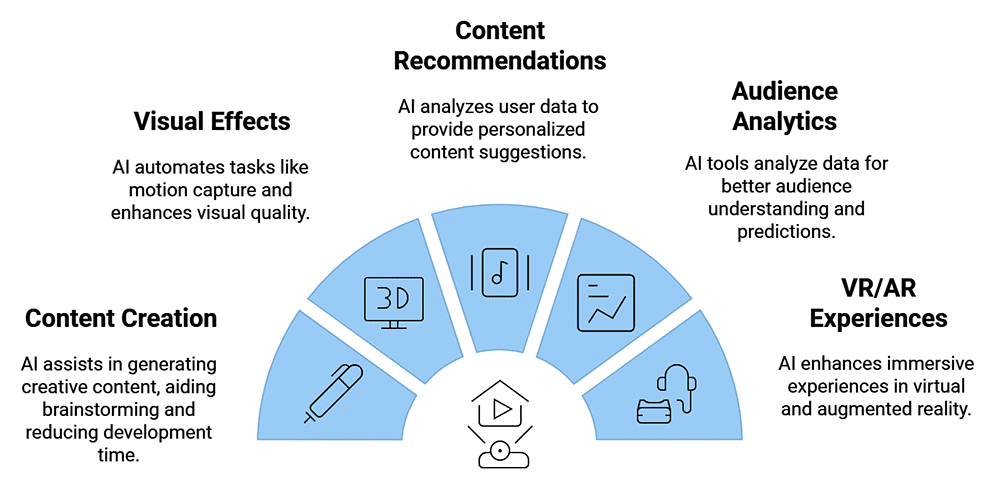
Four Revolutionary Benefits of AI in Entertainment Production
Artificial intelligence in the entertainment industry provides a number of benefits in an equally wide variety of areas. The following four examples highlight areas where AI has been revolutionary.
Video: Potential of AI and AI Technology Benefits. Risks of AI
1. Enhanced Pre-Production Planning
Pre-production planning refers to the work that goes into media before the production has begun. Elements include budgeting, script doctoring, and resource allocation. Pre-production can be a costly endeavor. However, artificial intelligence in the entertainment industry is revolutionizing pre-production through advanced technologies. Predictive analysis also factors into the process as it can suggest which areas require more attention during this phase of a project.
2. Streamlined Post-Production Workflows
Post-production work refers to everything that needs to be worked on after the actual production. This includes basic editing along with sound mixing. Artificial intelligence in the entertainment industry excels at time-intensive, repetitive, tasks. As such, AI is an element of computer science that has obvious appeal for post-production work. AI lets the creators work on the creative side of a project while the computers handle technical details. This results in faster and more efficient workflows.
3. Real-Time Production Optimization
Quality control is an important but typically slow part of business. However, emerging technologies like AI allow for real-time tweaking of products and productions. Artificial intelligence in the entertainment industry is now being used to monitor events and fix problems the moment they occur. For example, an AI monitoring camera angles during a show might notice performers moving out of frame. The system could readjust the camera and lighting to compensate with split-second accuracy.
4. Advanced Audience Analytics
Artificial intelligence in the entertainment industry is also being used to measure audience analytics. This includes how well a product performs as well as what might appeal to specific demographics. AI is an emerging technology that often functions as a bridge between creator and customer. AI can observe how specific marketing, shows, music, and more resonate with people. This allows for more targeted productions, which gives audiences engaging content while also driving up profits.
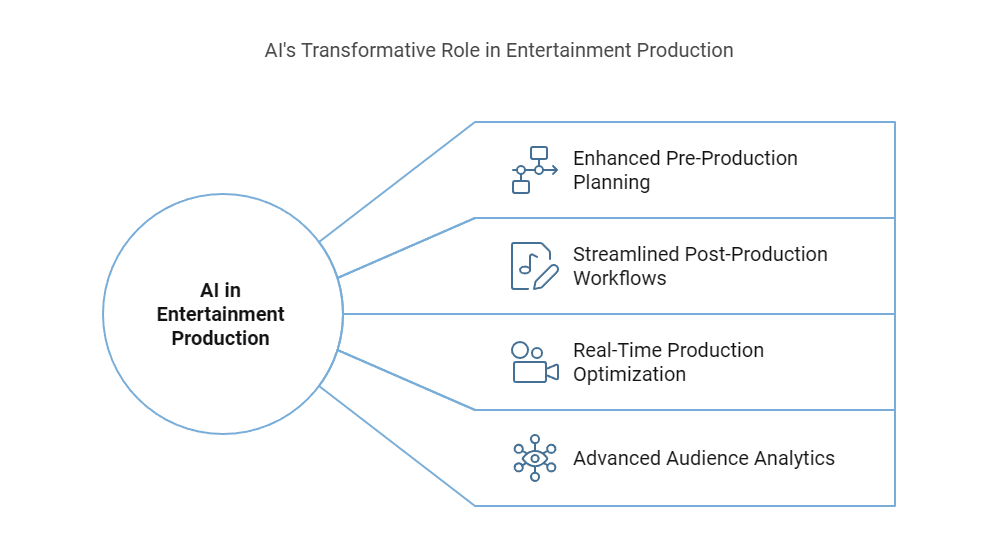
Three Strategic Approaches to AI Entertainment Implementation
Artificial intelligence in the entertainment industry is an undeniably powerful tool. However, like all tools it needs to be used as part of a larger-scale strategy. The following three approaches highlight the best ways to make sure that you’re getting the most out of the new technology.
Video: How AI is generating a revolution in entertainment
1. Building Strong AI Infrastructure
AI is an advanced technology that requires some preparation for its infrastructure. An entertainment company should ensure its technological foundation is fully AI-compatible. Artificial intelligence in the entertainment industry works best with a combination of high-speed networks and large amounts of relevant data. As such it’s especially well suited to cloud-based systems which can scale to match different scenarios. Companies should also ensure that the AI can access data which will help in its operations.
2. Developing AI-Ready Talent Teams
Artificial intelligence in the entertainment industry is a powerful tool, but it is still a tool. And tools are only as good as the people using them. This is why it’s important to ensure that people are ready to get the most out of AI. Companies should invest in training programs for employees. Additionally, you should create specific teams who are familiar with both AI and the entertainment industry. They can serve as a bridge between the two specialties.
3. Creating AI Integration Roadmaps
It’s easy to become lost in the wealth of options provided by AI. But you can stay on track with a solid AI integration roadmap. You should begin by prioritizing the easiest goals with the largest benefits. This will provide a proof of concept and inform further strategies. Next, consider more complex goals and create an objective map of how to reach them. AI provides a wealth of options, but this also means it’s easy to get lost in them. Roadmaps keep you on a set course.
Comparative Analysis of AI Entertainment Applications
Artificial intelligence in the entertainment industry is an expansive subject. However, the following information will provide you with a solid overview of applications within the field.
Current Challenges in AI Entertainment Integration
The following challenges are among the most significant concerns when implementing AI in entertainment.
- Technical Integration with existing systems: Your existing digital infrastructure needs to be compatible with AI.
- Ensuring proper data privacy standards: When working with customer data, you need to ensure it’s properly secured while also staying transparent about your collection procedures.
- Maintain consistent quality control: Automated tasks like content creation will require oversight and quality assessment to judge adherence to your standards.
- Create strategies for cost management: You’ll need to weigh short-term costs for the initial investment against long-term costs and profit.
- Help your talent adapt: Plan AI training programs for entertainment professionals.
- Maintain your creative control: Artistic vision is still your guiding principle, and you need to establish guidelines so that AI works with it instead of replacing it.
Future Opportunities in AI Entertainment
The future of AI in entertainment presents exciting possibilities for innovation:
- Adapt, grow, and fix content in real-time: AI can monitor viewer reactions and modify content in response.
- Personalized content delivery for viewers: AI can adapt media to match users’ preferences and distribute it through multiple platforms according to their needs.
- Automate localization of your media: AI can go beyond translation and adapt media to match the subtle cultural differences in any region.
- Create virtual environments: AI can create both special effects and virtual sets.
- Change narratives with interactive storytelling: AI can create branching narratives to allow viewers to influence the direction of a story.
- Find insight into an audience with enhanced analytics: AI can create more individualized and targeted content by learning from analytic data.
Virtual Reality Entertainment: The Future of Immersive Experience
Artificial intelligence in the entertainment industry is one of the most significant new technologies. However, it’s far from the only exciting development in recent years. Virtual reality (VR) is also proving popular with creators and audiences alike. Film and cinema are an obvious match for VR. However, the application goes beyond any one part of the larger industry. Museums, arcades, and more are discovering their own uses.
You can learn more about the entertainment industry’s use of VR in the article “Virtual Reality in Entertainment; Examples of VR in Entertainment”.
AI Marketing: Revolutionizing Business Promotion
Marketing is an important part of business. As such, it’s little surprise that marketing can have a heavy impact on artificial intelligence in the entertainment industry too. The same AI technologies that power parts of the entertainment industry can also be used in marketing it. In fact, most industries can use forms of AI marketing to leap ahead of the competition. AI powers everything from analytics to ad placements.
You can see the impact of AI in the business world and marketing in the article “AI Marketing; Take Advantage of Artificial Intelligence Strategies”.
Did You Like This Article about Artificial Intelligence in the Entertainment Industry?
You might also be interested in the following articles:
- Artificial Intelligence Quiz; Challenge Yourself with the Ultimate AI Quiz!
- Metaverse Guide; Understanding The Basics Will Open Up a New World
- Top Popular Metaverse Games To Explore Right Now
Artificial intelligence in the entertainment industry offers endless possibilities. So take a moment to consider how what you’ve read so far applies to you, and get ready to successfully leverage these new technologies.

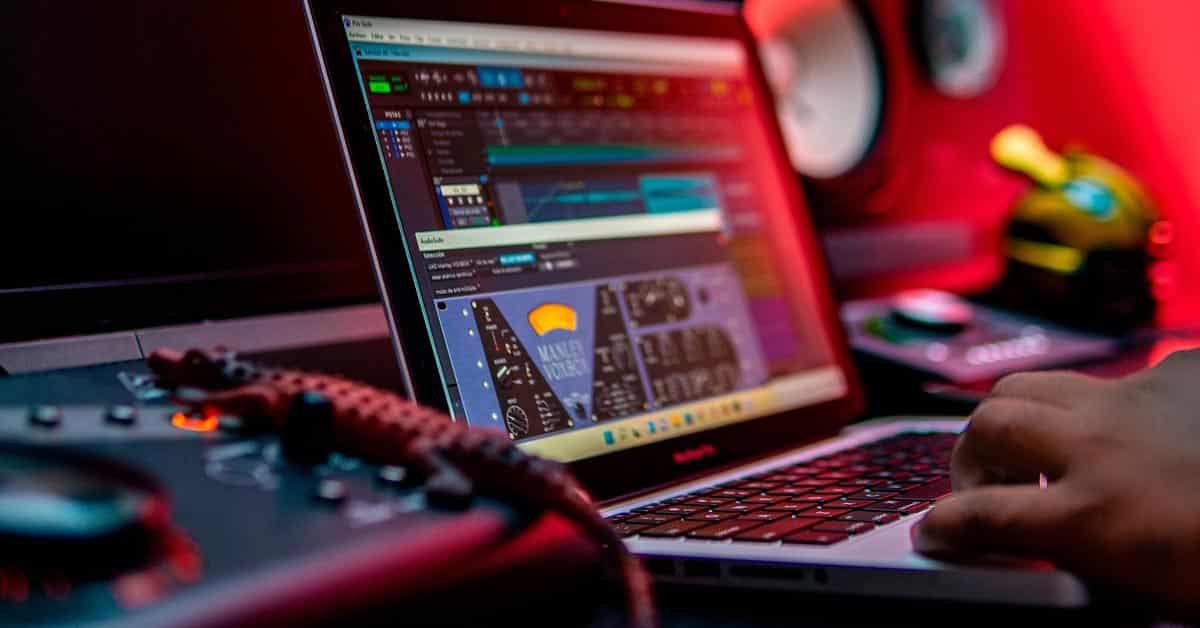
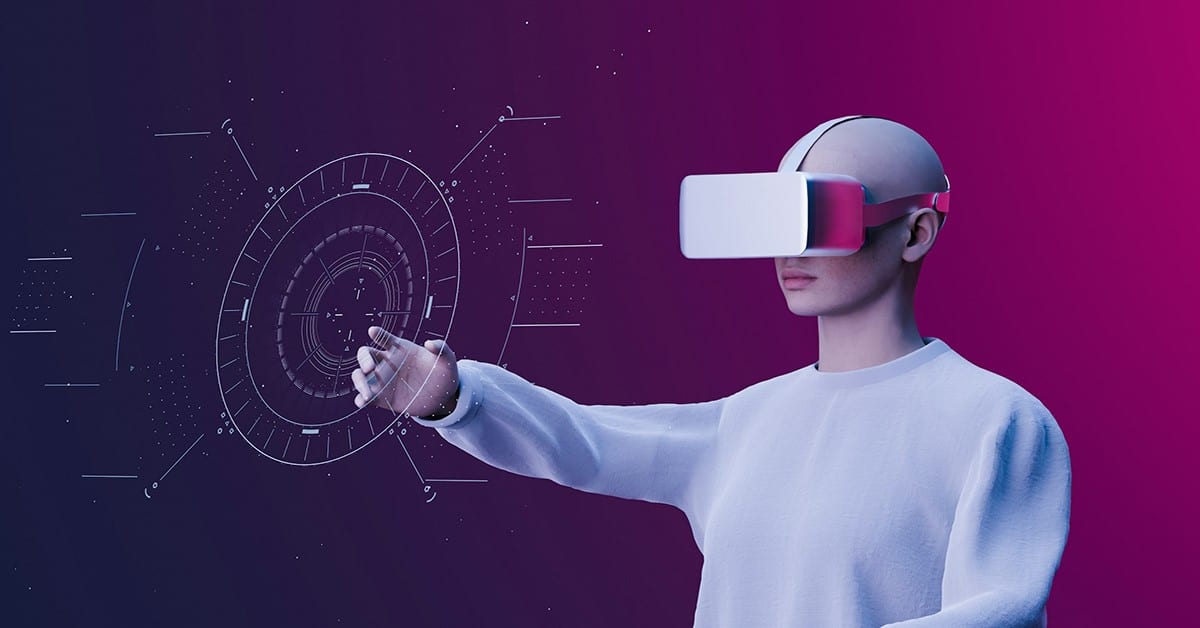
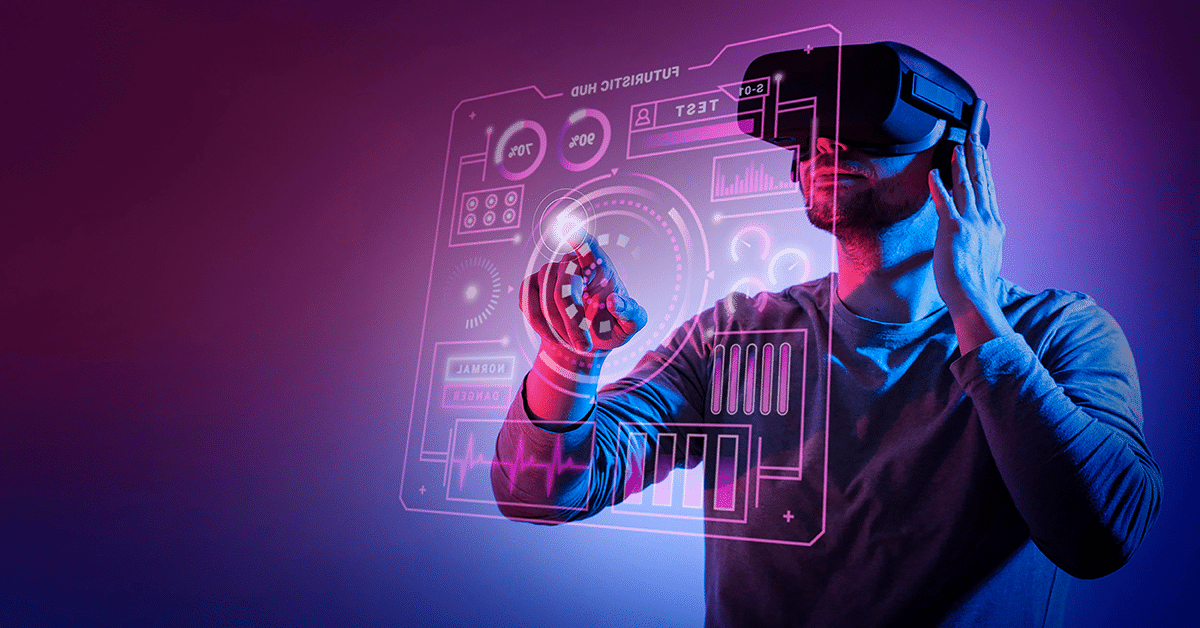


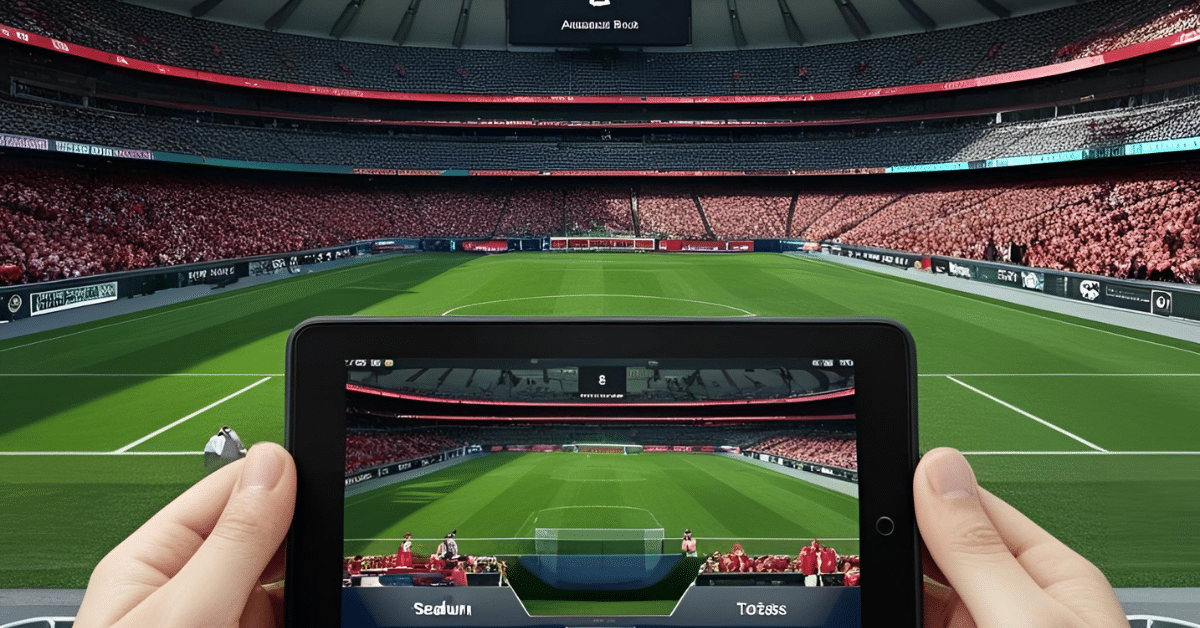
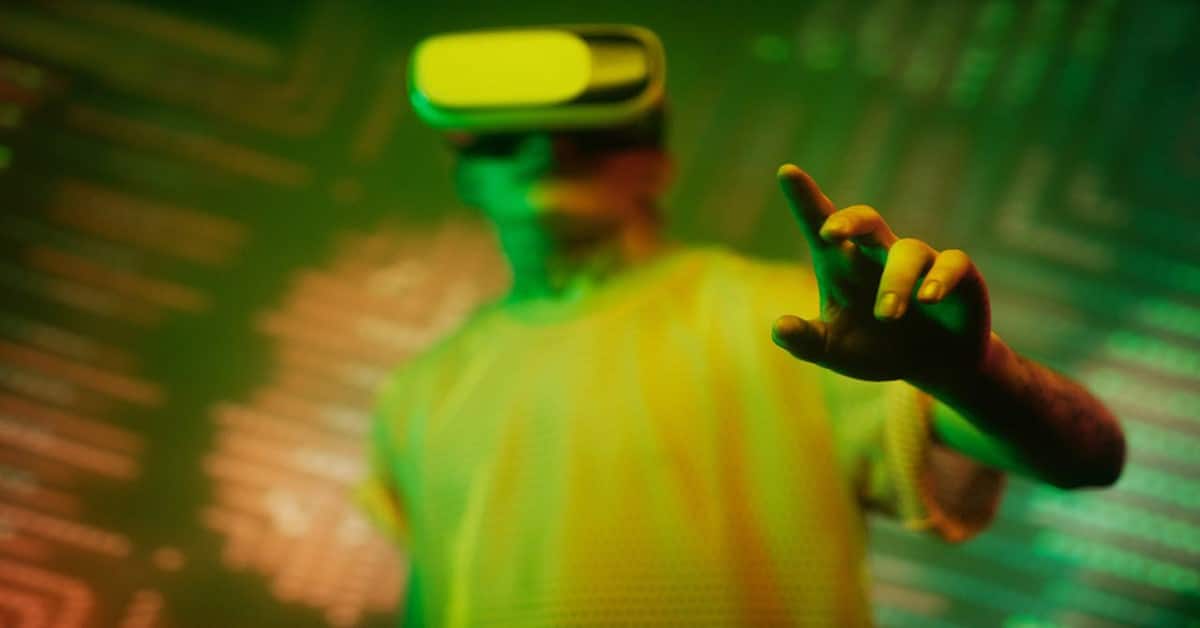

Leave A Comment